THE PIONEER ALLIANCE AMBITION
The alliance includes five complementary universities in the field of social sciences, humanities, information technologies and engineering all providing educational offerings linked to Future Cities. These Scientific Universities and Universities of Applied Sciences provide a unique combination within the scientific and professional domain. The partners are University Gustave Eiffel (FR), ISCTE – University Institute of Lisbon (PT), TH Köln – University of Applied Sciences (GE), Laurea University of Applied Sciences (FI), and University of Zilina (SK). They have started to collaborate in 2020 and the PIONEER project will bring their cooperation to the next level through institutional transformations. The alliance brings together research-intensive universities and universities of applied sciences, different levels of education from bachelor level to doctoral education united by the theme of inclusive, sustainable and resilient cities.
By creating a holistic joint learning, research and innovation model for society, the PIONEER alliance bridges activities and stakeholders across Europe to develop and mobilize a new generation of learners, knowledge producers, and entrepreneurs for future cities, business life, and citizens. Through the model the universities together with cities gather relevant stakeholders, co-create, and orchestrate Pan-European ecosystems integrating scientific knowledge, addressing societal European needs through citizen engagement, seizing the opportunities and meeting the challenges of future cities, in a 2030 perspective.
The PIONEER ambition is twofold:
I. Creating a European Open campus focused on the future cities

Building a European University based on the unique PIONEER co-creation model to connect education, research, innovation and service for society to address major challenges of future cities in relation with the European agenda (Green Deal, 100 Carbon neutral cities, Regional smart specialisation strategies, Digital transformation, Open science).
II. Being a role model for value co-creation orchestration for European Universities
Co-creating, experimenting, benchmarking best practises from alliance members in a reflective continuum, in order to provide guidelines for other universities.
The PIONEER alliance universities train altogether over 70.000 students with 8.000 faculty and staff members on 20 campuses, 18 cities and 9 regions:

THE PIONEER ALLIANCE VISION
Objectives & Challenges For Future Cities
Almost 70% of the European population lives in urban areas, generating more than two thirds of the Union’s GDP, but also facing unemployment, segregation and poverty as well as severe environmental constraints. The construction of inclusive, sustainable, and resilient cities requires questioning the green and digital transitions from an interdisciplinary perspective. The various transformations of urban areas are intertwined and complex. Evolutions of cities call for renewed governance models able to build on adapted forms of citizen participation, facilitating the expression of needs and people’s involvement in city development. All universities are strongly connected with their cities, regions and their ecosystems. The partners share a firm commitment to serve societal needs in connection with citizens and stakeholders and contribute to policies in urban areas, which are of particular importance for the European Union.
The General Objectives of the PIONEER Project
Co-create, experiment, validate, and implement PIONEER Transformation Model for HEIs and Cities.
Transform PIONEER HEIs into a worldwide visible community dedicated to the cities’ transitions in EU regions, connected worldwide with its associated partners, considering societal and economical changes in a world exposed to crisis (environmental, health, terrorism, poverty, migrations, inequalities) and organised through a common campus governance model.
Set up an open campus to increase mobility among students, staff, and PIONEER partners
Enable PIONEER students, staff, and external partners to take part in physical, virtual and blended mobility and promote inclusion of students coming from disadvantaged backgrounds, different geographical regions, high-competition, single-parent families or with disabilities, by implementing a specific accessibility mobility plan.
Promote European values and enhanced skills for employability and equity
Improve the quality of education and learning by engaging students and academic communities in joint learning and innovation co-creation activities with the city ecosystems, promoting European values and Sustainable Development Goals (SDGs) for increased employability across Europe.
Increase respect for human dignity and diversity and enhance inclusion of people representing diverse cultural, religious and ideological backgrounds, physical and cognitive capabilities in the society at large and among its staff and students in particular.
Develop knowledge and innovation communities across partner universities and European city ecosystems
Connect researchers, teachers, staff, students and ecosystems actors in hubs to set up a common language, share practices, and co-construct joint agendas serving the needs of citizens and advancing sustainability, resilience and inclusion of cities.
Co-create, experiment, validate & implement a pedagogical, research and innovation co-creation model to develop knowledge, future employees’ skills & solutions to meet the challenges of future cities
Co-create a joint innovative model that interconnects research, education, innovation and services to society: provide multidisciplinary joint and double degrees, involving the use of the latest digital technologies and transversal skills through a STEAM (Science, Technology, Engineering, Arts and Mathematics) approach. Design innovative solutions for city-based challenges through joint research programmes and Living Labs approach that fosters entrepreneurship, including multi-scale experiments at both technical and social levels to address societal and economic changes. Co-construct the PIONEER alliance following the innovative co-creation model that the alliance aims to epitomize, formalise and promote.
Maximise Pioneer alliance impact on society, educational and scientific excellence
Engage citizens in learning as well as research and innovation co-creation and experimentation activities to address societal needs and global challenges, such as the EU Green Deal, the Digital Transition and UN SDGs.
The challenges of future cities addressed by the PIONEER alliance
This alliance gives significant space for both social sciences and humanities as well as engineering and data sciences to develop both technological and social or societal innovation, to face climate change and related resource shortage and to create the needed behavioural changes. It focuses on challenges of future cities, which by nature, are interdisciplinary considering the variety of cities in terms of their size and challenges, i.e., physical, ecological, technical, human, and societal. Urban issues are also inter-sectoral due to the multiplicity of actors and international in the context of globalization. Young actors an experienced professional in urban R&I must be trained early in this multiplicity. PIONEER focuses on inclusive, sustainable and resilient cities development and citizens’ well-being.
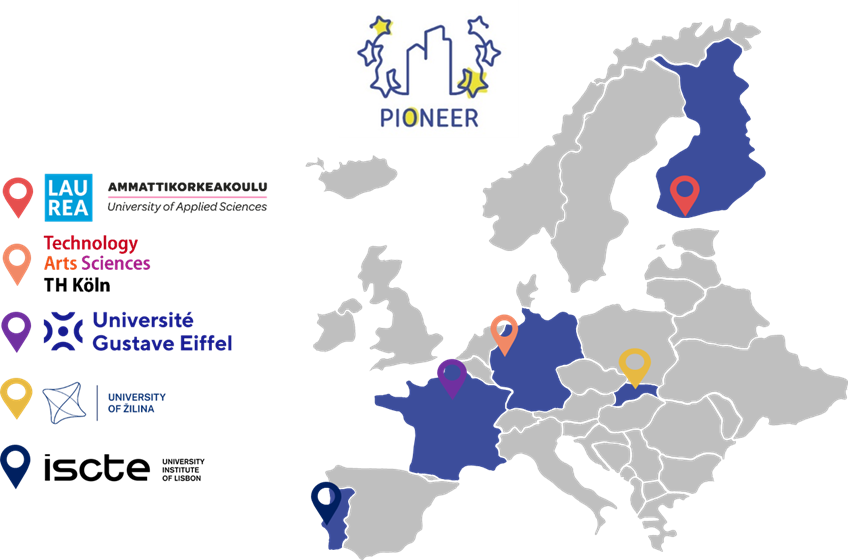
The PIONEER alliance is able to address the following challenges of future cities:
- Carbon-neutral urban areas;
- Safety, security and risk management for resilient cities;
- Technology enhanced solutions with and for smart and citizen-centred cities;
- Service design with and for socially, culturally, ecologically, and economically sustainable future cities;
- Sustainable urban life and tourism;
- Circular economy with and for urban citizens.
All alliance activities will feed the Sustainable Development Goals and foster multi-disciplinarity:
- Sustainability: by considering 13 out of 17 Sustainable Development Goals (SDGs) by 2030 in all its activities:

- Multidisciplinary: multiscale (local, regional and international), multidisciplinary networking with a STEAM approach to create an open inter-university campus embedded in various territories throughout Europe, each connected with stakeholders to contribute to the regional smart specializations.
The PIONEER alliance aims at transforming the HEIs in connection with their ecosystems to develop transnational knowledge on 7 topics applied to an urban context.
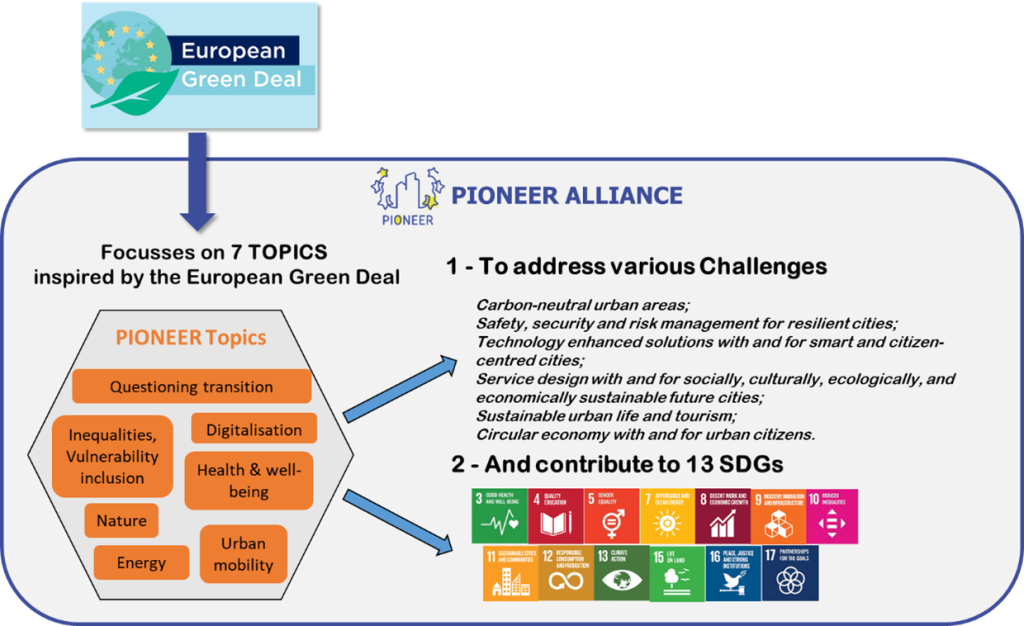
The activities related to the topics will enable the PIONEER alliance to meet the specific challenges of the future cities.
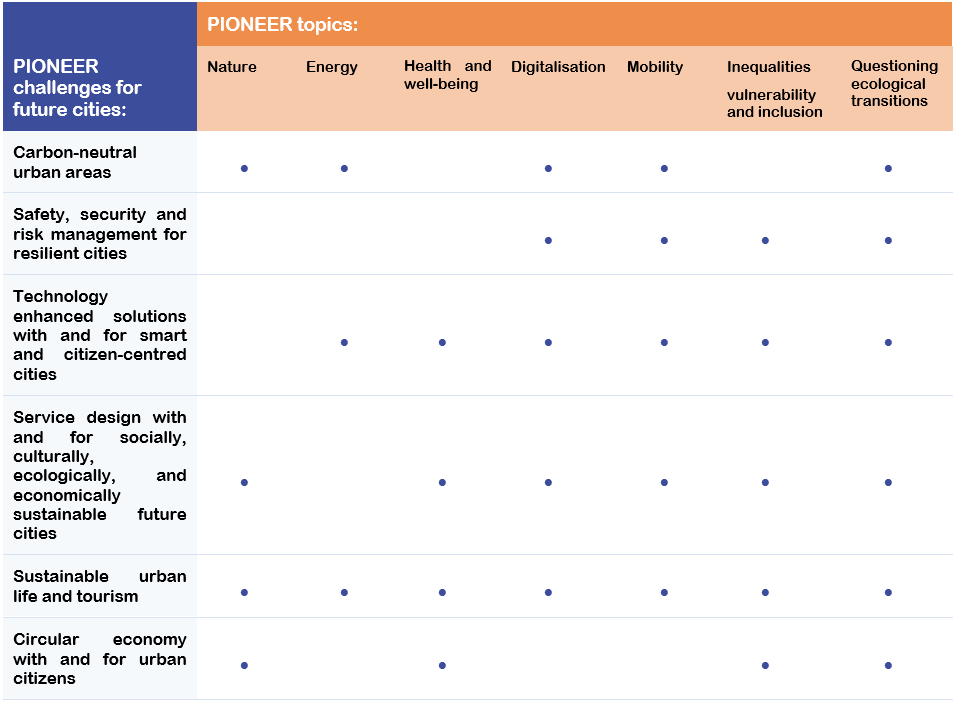
The future structures of the PIONEER Alliance to address the challenges of future cities
In 2024 the PIONEER campus will be embodied in the European without walls PIONEER Institute for Future Cities. This Institute will orchestrate the interactions between multiple stakeholders (students, academics, professionals, public authorities, etc.) to support and bridge intersectoral and multidisciplinary activities linking education, research, innovation and service for society, namely for citizens and cities.
The PIONEER Institute for Future Cities will be complemented by a PIONEER forum driven by the core partners of the Alliance and widely open to the associated partners to develop the network of external stakeholders and partners of the city ecosystems with which the Institute will constantly interact to implement its daily activities.
The future structures of the PIONEER Alliance to address the challenges of future cities
In 2024 the PIONEER campus will be embodied in the European without walls PIONEER Institute for Future Cities. This Institute will orchestrate the interactions between multiple stakeholders (students, academics, professionals, public authorities, etc.) to support and bridge intersectoral and multidisciplinary activities linking education, research, innovation and service for society, namely for citizens and cities.
The PIONEER Institute for Future Cities will be complemented by a PIONEER forum driven by the core partners of the Alliance and widely open to the associated partners to develop the network of external stakeholders and partners of the city ecosystems with which the Institute will constantly interact to implement its daily activities.
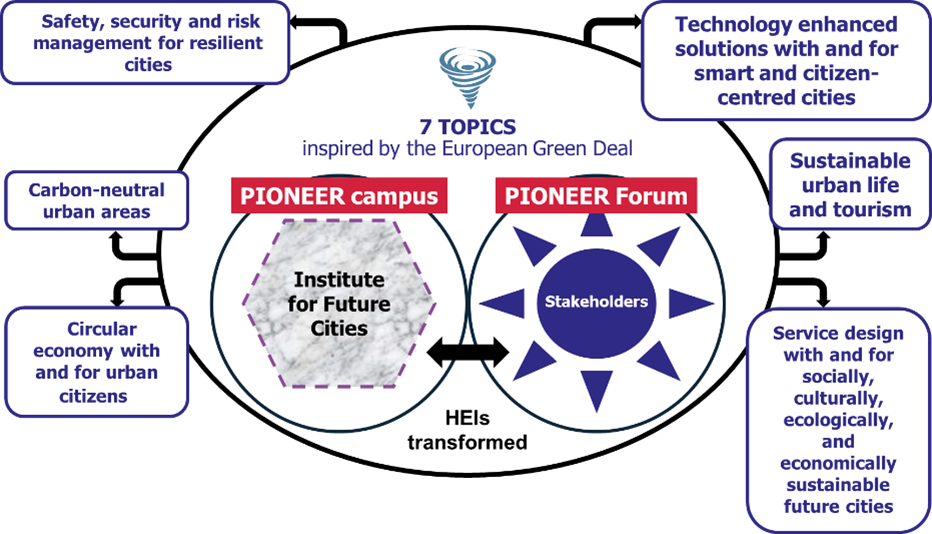
The FORUM provides knowledge exchanges, policy making experiences, research results & FAIR data. It also provides companies participating in the PIONEER ecosystem an opportunity to benefit from the Living Labs, Test Beds, Research Infrastructures (RI) and Technology Infrastructures (TI) available in cities in order to co-create, test, validate and scale-up innovation across Europe. The Forum will facilitate talents circulation, help to identify employment and research needs, and showcase PIONEER training offering for citizens, cities, companies and NGOs. This Forum will be nurtured by the cutting-edge knowledge from education and research programs from the Pioneer Institute; it will operate through regular events during the project and beyond.
The PIONEER alliance builds the collective capacity and pathway towards excellence of all with the creation and integration of its European knowledge HUBs: research, education and their surrounding innovation ecosystem. The HUBs activities rely upon 7 Topics. Attached to these HUBs, the research facilities, the new curricula and the innovation platforms and pilots converge to support new open European learning activities. Moreover, the European campus will enable to find new, multidisciplinary and transnational creative solutions to the global challenges of urban development.
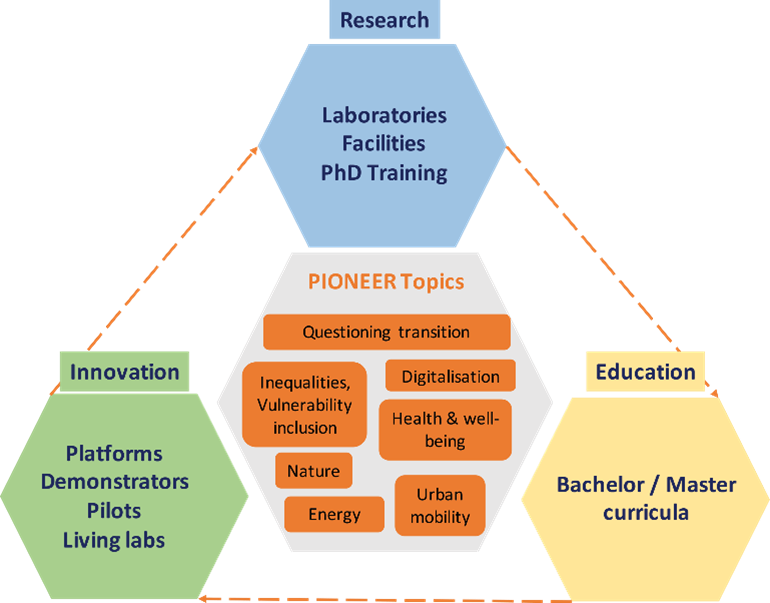
The Alliance quadruple helix model to address cities’ challenges and citizens’ needs
The main steps guiding the implementation of the Pioneer alliance are the following:
- Co-create the value co-creation model,
- Networking and sharing, foreseeing,
- Developing projects and experimenting value co-creation,
- Analysing results and giving feedback,
- Institutionalising and formalising guidelines based on the diversity and strengths of each partner.
The building of the Pioneer alliance itself will epitomize the co-creation process which will be the role model for the transformation of HEIs based on Hubs. The holistic joint learning, research and innovation model will be implemented for all kinds of learners, including the communities outside the universities.
Whatever the entry point in the quadruple helix (education, research, innovation or society and citizens’ needs), the other components of the helix will be systematically involved. For example, the design of new curricula will be linked to the needs of metropolitan regions for expertise, will involve research activities, challenge-based learning and will encourage entrepreneurship. When the activity starts from a research project, it will feed the development of new learning, involve citizens in the collection of data and living labs, and lead to innovations. If the starting point is the expression of needs from the partner cities, boot camps, hackathons and other pedagogical activities will foster research activities, generate innovative concepts and solutions that can be transformed into new economic activities. Moreover, all stakeholders (students, staff, cities and external stakeholders) will benefit from the European dimension of all activities, through the combination of complementary expertise, comparative approaches, practice sharing, and multiple opportunities. After four years, the PIONEER alliance will be at the center of urban ecosystems connected to implement the European agendas for inclusive, sustainable, and resilient cities.
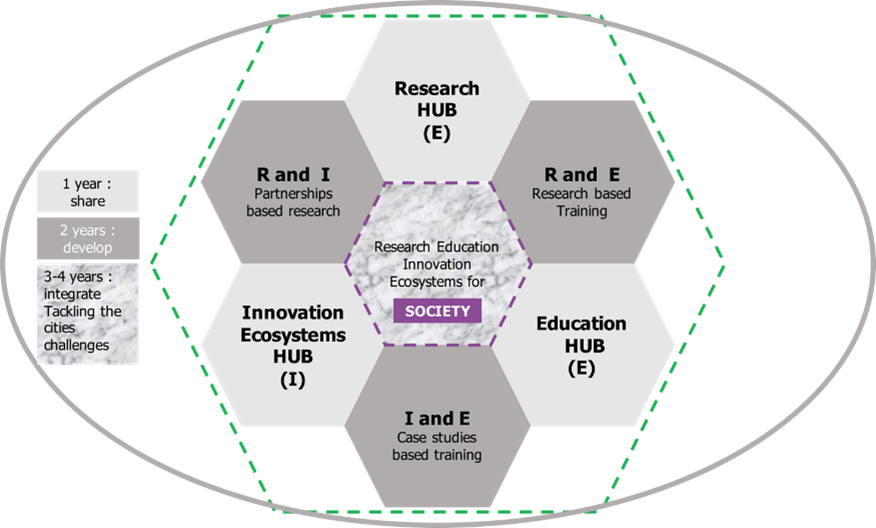
THE PIONEER ALLIANCE GOVERNANCE
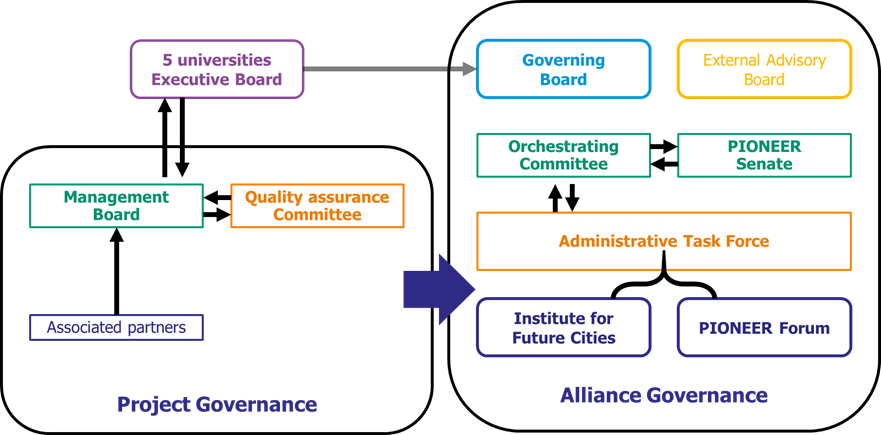
The PIONEER alliance operates within a multilateral structure governed by the board of 5 rectors, an orchestrating committee of vice-rectors and a senate of elected representatives including students, supported by an administrative task force. The governance structure is composed of:
- A multilateral without wall institute called “Institute for Future Cities” that sustains long-term cooperation to build programmes; this institute operates value co-creation bridging education, research and innovation with and for society by orchestrating multidisciplinary communities and
- A forum of partners and stakeholders who contribute to feed the model with needs, good practices, operational pilots and testing possibilities and benefit from the Institute activities.
Both the Institute for Future cities and the Pioneer Forum will be open to the world.
The Alliance is set by the Project. The management board (5 international vice-rectors of the 5 HEIs) is transformed into the orchestrating committee involving several vice-rectors of the HEIs. The students (B, M, D) will be included in some project management meetings and also in the Alliance senate. The students’ representatives are to be designated through common rules adopted by the alliance to reach a balance between HEIs. They will also be invited to the annual General Assembly meetings of the alliance.
The annual General Assembly will gather all PIONEER boards, bodies and students’ representatives. Meetings of the Governing Board will be organised every year. Meetings of the Advisory Board will be organized back-to-back with the Governing board on an annual basis.
The trajectory of transformation into an Alliance
The implementation of the project will follow a 3-step trajectory:
- Developing the value co-creation model: providing guidelines to the development of joint activities
- Building the hubs to implement the model:
- Bringing communities together at the European level, connecting and sharing, experimenting cross-cutting activities enacting the quadruple helix model
- Developing toolkits and enabling activities (mobility, diversity and inclusion plan, career development, etc.)
- institutionalising the orchestration activities into the Institute and the Forum. Setting the governance and providing administrative support.
Besides the construction of the PIONEER Alliance, the members will engage into a systematic reflective and evaluative analysis of the co-creation process to act as a role model for other European universities. The orchestration of the PIONEER innovative co-creation processes will lead to new institutional forms of cooperation and will constitute a role model formalised in a white book that will provide guidelines for the transformation of European HEIs.
